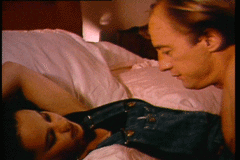|
Newest Reviews:
New Movies -
The Tunnel
V/H/S
The Tall Man
Mama Africa
Detention
Brake
Ted
Tomboy
Brownian Movement
Last Ride
[Rec]≥: Genesis
Hara-Kiri: Death of a Samurai
Indie Game: The Movie
Abraham Lincoln: Vampire Hunter
Old Movies -
Touki Bouki: The Journey of the Hyena
Drums Along the Mohawk
The Chase
The Heiress
Show
People
The Strange Affair of Uncle Harry
Pitfall
Driftwood
Miracle Mile
The Great Flamarion
Dark Habits
Archives -
Recap: 2000,
2001, 2002,
2003, 2004
, 2005, 2006,
2007 , 2008
, 2009 ,
2010 , 2011 ,
2012
All reviews alphabetically
All reviews by star rating
All reviews by release year
Masterpieces
Screening Log
Links
FAQ
E-mail me
HOME
| |
36 Fillette (Catherine Breillat) 1988
 Fourteen-year-old Lili (played by sixteen-year-old Delphine
Zentout) finds her life to be a drag. Everything in the world seems to be
conspiring against her in an attempt to ruin her. Sheís miserable, and she
puts up a hard exterior shell in an attempt to conceal the fear she has that
sheís somehow inadequate to face. She dresses in black, and usually has her
hair covering her eyes. She wants to remain distant from people, since they
usually turn out to be phony. Her brother is at once her only salvation from her
parents while on vacation, and her greatest annoyance. Sheís as temperamental
as she is judgmental. She is not afraid to appear outwardly unlikable to the
world, and that quality makes her the ideal protagonist of Catherine
Breillatís fascinating character study, 36 Fillette, a title taken from
a French childís dress size. Fourteen-year-old Lili (played by sixteen-year-old Delphine
Zentout) finds her life to be a drag. Everything in the world seems to be
conspiring against her in an attempt to ruin her. Sheís miserable, and she
puts up a hard exterior shell in an attempt to conceal the fear she has that
sheís somehow inadequate to face. She dresses in black, and usually has her
hair covering her eyes. She wants to remain distant from people, since they
usually turn out to be phony. Her brother is at once her only salvation from her
parents while on vacation, and her greatest annoyance. Sheís as temperamental
as she is judgmental. She is not afraid to appear outwardly unlikable to the
world, and that quality makes her the ideal protagonist of Catherine
Breillatís fascinating character study, 36 Fillette, a title taken from
a French childís dress size.
 Breillatís film does not ever attempt to apologize or
explain Liliís behavior. With an almost clinical analysis, it presents a few
days her life as Maurice, a forty-something year old man that appears to be
entrenched in a serious mid-life crisis, courts her. She is simultaneously
repelled and attracted to him. She is smart enough to realize he wants her for
little more than sex, though naÔve enough to hope for more. In any case, she is
eager to give up her virginity, so that her anxiety that comes with it will end.
Her virginity is an absolute curse. She feels sexually impotent since she has
never had sex. This is material that Breillat would later cover in her fantastic
Fat Girl, but here it feels as if itís more surface level. Liliís
abhorrence of her virginity seems to be a whim brought on by a fight with her
family. The film uses an almost autobiographical, documentary feel, as opposed
to Fat Girlís directorial shimmer, but the film hardly feels like a
trial run. The scenes showing the courtship between Lili and Maurice often slow
down to an almost real-time pacing, and they are stunning because the
interchange of power becomes completely palpable. Zentoutís lead performance
is as accomplished as they come. Her Lili is a tremendously complex character,
even as the audience is able to see the gaps in her ill-formed logic. Breillat
never allows the film to become solely about the age gap between the two
characters. She is after something more here than simple moralizing, and
doesnít simply let Lili off the hook. Her approach may seem cold, but itís
precisely by not making judgments on her characters that she endows the audience
with the greatest understanding of the situation. Breillatís film does not ever attempt to apologize or
explain Liliís behavior. With an almost clinical analysis, it presents a few
days her life as Maurice, a forty-something year old man that appears to be
entrenched in a serious mid-life crisis, courts her. She is simultaneously
repelled and attracted to him. She is smart enough to realize he wants her for
little more than sex, though naÔve enough to hope for more. In any case, she is
eager to give up her virginity, so that her anxiety that comes with it will end.
Her virginity is an absolute curse. She feels sexually impotent since she has
never had sex. This is material that Breillat would later cover in her fantastic
Fat Girl, but here it feels as if itís more surface level. Liliís
abhorrence of her virginity seems to be a whim brought on by a fight with her
family. The film uses an almost autobiographical, documentary feel, as opposed
to Fat Girlís directorial shimmer, but the film hardly feels like a
trial run. The scenes showing the courtship between Lili and Maurice often slow
down to an almost real-time pacing, and they are stunning because the
interchange of power becomes completely palpable. Zentoutís lead performance
is as accomplished as they come. Her Lili is a tremendously complex character,
even as the audience is able to see the gaps in her ill-formed logic. Breillat
never allows the film to become solely about the age gap between the two
characters. She is after something more here than simple moralizing, and
doesnít simply let Lili off the hook. Her approach may seem cold, but itís
precisely by not making judgments on her characters that she endows the audience
with the greatest understanding of the situation.
* * * 1/2
October, 2001
Jeremy Heilman
|